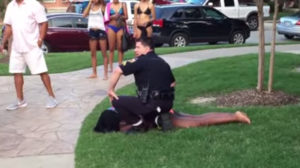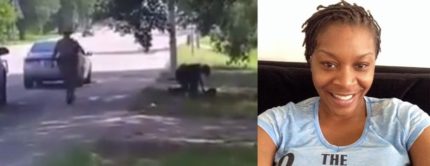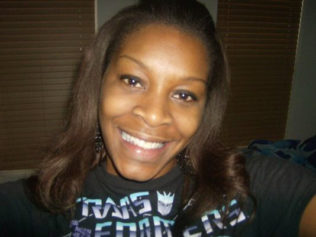
According to The Root, four other Black women have died in police custody this month. Their names are Raynette Turner, Joyce Curnell, Ralkina Jones and Kindra Chapman. Some of these women were arrested for minor infractions such as petty theft, others committed more serious crimes such as assault and domestic violence. But none of them made it out of their jail cells alive.
Even before this recent spate of jailhouse deaths, there were other cases of police acting aggressively toward Black women. In June, McKinney, Texas, police officer Eric Casebolt was videotaped wrestling a 14-year-old Black girl to the ground, sitting on her and pointing his gun at other Black teens. After the video was uploaded to YouTube and went viral, Casebolt resigned from the police force.
Brittney Cooper, contributing writer at Salon and professor of Women’s and Gender Studies and Africana Studies at Rutgers, said many white people often perceive Black women as aggressive and think they have to deal with them harshly.
“Black girls are never deemed feminine enough for their sexual and adolescent vulnerability to register for white people,” Cooper said. “They are frequently viewed as aggressors by both police and regular citizens alike, even for doing very adolescent things like mouthing off to those in authority. This is the reason why education scholars suggest that Black girls are suspended from school six times as often as white girls, because even simple adolescent forms of testing boundaries are perceived as far more aggressive based on race.”
According to Huffington Post writer Sikivu Hutchinson, many people feel Black women’s combative attitudes justify aggressive treatment by the police. Fox News host Elisabeth Hasselbeck drew widespread derision when she suggested Bland may have used her cigarette as a weapon against Trooper Brian Encinia and brought the violent attack on herself.
“This racist sexist theme of culpability — i.e., ‘the Black bitch deserved it’ — is a recurring one in mainstream perceptions of Black women’s inability to be victims,” Hutchinson said. “After the dashcam footage of Bland’s arrest was released thousands of online commenters rushed in to vilify her as a ‘thugette’ who provoked the officer’s response and, presumably, her own death. In a culture in which Black female bodies are racialized and sexualized as out of place, Black women are never granted the space of the open road, the freedom to be mobile, self-determined or fearless without permission. Sandra Bland didn’t ask for it.”
Hutchinson also pointed out Waller County District Attorney Elton Mathis had released information designed to stain Bland’s reputation. Mathis said Bland was not a “model citizen” and implied she may have ingested marijuana after her arrest.
Apart from being subject to violent arrest, Black women also worry about sexual assault during encounters with the police.
“True to their long history of being victimized by state-sanctioned sexual violence, Black women are more likely to suffer sexualized violence during police encounters or in police custody,” Hutchinson said.
Oklahoma City police officer Daniel Holtzclaw faces charges for sexually assaulting 13 Black women while on duty. In many cases, Holtzclaw allegedly coerced the women into having sex with him to avoid going to jail.
One victim testified in court, “He was an officer. And I was scared and knew he could hurt me.”


